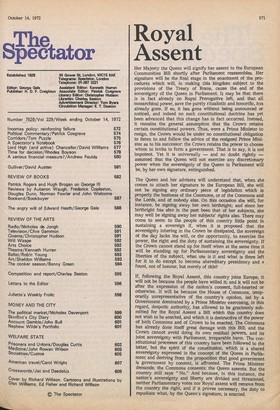Royal Assent
Her Majesty the Queen will signify her assent to the European Communities Bill shortly after Parliament reassembles. Her signature will be the final stage in the enactment of the procedures which will, in making this kingdom subject to the provisions of the Treaty of Rome, cause the end of the sovereignty of the Queen in Parliament. It may be that there is in fact already no Royal Prerogative left, and that all monarchical power, save the purely ritualistic and honorific, has already gone. If so, ilt has gone without being announced or noticed, and indeed no such constitutional doctrine has yet been advanced that this change has in fact occurred. Instead, it remains the general assumption that the Crown retains certain constitutional powers. Thus, were a Prime Minister to resign, the Crown would be under no constitutional obligation to listen to and follow the advice of the resigned Prime Minister as to his successor: the Crown retains the pOwer to theme whom to invite to form a government. That is to say, it is not impotent. Yet it is universally — and no doubt rightly assumed that the Queen will not exercise any discretionary power when the sovereignty of the Queen in ParRament will be, by her own signature, extinguished.
The Queen and her advisers will understand that, when she comes to attach her signature to the European Bill, she will not be signing any Ordinary .piece Of legislation which is properly the business Of the Commons, or of the Commons and the Lords, and Of nobody else. On this occasion she Will, for instance, be signing away her own birthright; and since her birthright has also in the past been that Of her subjects, She may well be signing away her subjects' rights also. There may come to seem to the people of this country little point in sustaining a sovereign if, when it is prOpbsed that the sovereignty inhering in the Crown be dissipated, the sovereign of the day lacks the will, or the opportunity, to exercise the power, the right and the duty of sustaining the sovereignty. If the Grown cannot stand up for itself when at the same time it will be standing up for Parliamentary sovereignty and the liberties of the subject, what use is it and what is there left for it to do except to become &hereditary presidency and a fount, not of honour, but merely of title?
If, following the Royal Assent, this country joins Europe, it will nolt be because the people have willed it; and it will not be after the expression of the nation's consent, full-hearted or otherwise. It will be because the House of Commons, temporarily unrepresentative of the country's opinion, led by a Government dominated by a Prime Minister exercising, in this regard, despotic authority, has allowed to be graciously submitted for the Royal Assent a Bill whicth this country does not wish to be enacted, and which it is destructive of the power Of both Commons and of Crown to be enacted. The Commons has already don'e itself great damage with this Bill; and the Crown cannot avoid doing its own residtail powers, and its joint sovereignty with Parliament, irreparable harm. The constitutional processes of this country have been followed to the letter, but the spirit of the constitution, which is a shared sovereignty expressed•in the concept of th'e Queen in Peril*. .ment and deriving from the proposition that good government it government by consent, is affronted. The Prime Minister demands; the Commons consents; the Queen assents. But the country still says "No." And because, in this instance, the nation's sovereignty and liberty are diVided and threatened, neither Parliamentary votes nor Royal assent will remove from the country the right, and if it proves necessary, the duty to repudiate what, by the Queen's signature, is enacted.














































 Previous page
Previous page